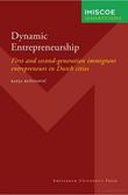Explore

Migranten van de tweede generatie in Nederland blijken als ondernemer aanmerkelijk succesvoller dan hun collega's van de eerste generatie. Dit blijkt uit de studie Dynamic Entrepreneurship van Katja Rusinovic. Rusinovic volgde voor haar promotieonderzoek langdurig eerste en tweede generatie migrantenondernemers in de vier grote steden. De resultaten van Rusinovic' studie laten zien dat de overlevingskansen van de tweede generatie groter zijn dan van eerste generatie migranten. Migranten van de tweede generatie vinden vaker hun weg naar financiële en andere (overheids)instanties waardoor zij minder afhankelijk zijn van steun uit eigen kring dan eerste generatie migranten. Ook richt de tweede generatie zich voornamelijk op klanten buiten de eigen etnische gemeenschap. Zakelijke contacten in het herkomstland blijven voor zowel de eerste als de tweede generatie een rol van betekenis spelen. Met hun sector keuze, hun oriëntatie op de Nederlandse samenleving, hun dynamiek en kansen op economisch succes maakt de tweede generatie een drastische bijstelling van het traditionele beeld van migrantenondernemers noodzakelijk.
This book is included in DOAB.
Why read this book? Have your say.
You must be logged in to comment.
Rights Information
Are you the author or publisher of this work? If so, you can claim it as yours by registering as an Unglue.it rights holder.Downloads
- 160 - pdf (CC BY-NC) at OAPEN Library.
Keywords
- Entrepreneurship
- Mathematics & science
- Migration, immigration & emigration
- Minority business enterprises
- popular science
- Science: general issues
- Social issues & processes
- Society & culture: general
- Society & Social Sciences
- thema EDItEUR::J Society and Social Sciences::JB Society and culture: general::JBF Social and ethical issues::JBFH Migration, immigration and emigration
- thema EDItEUR::P Mathematics and Science::PD Science: general issues
- Wetenschap algemeen
Links
DOI: 10.5117/9789053569726Editions

